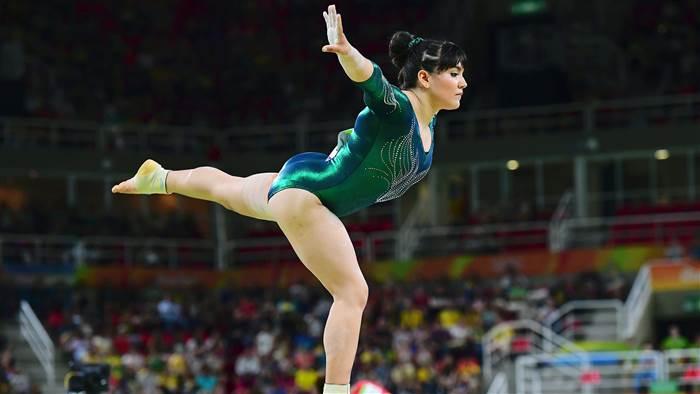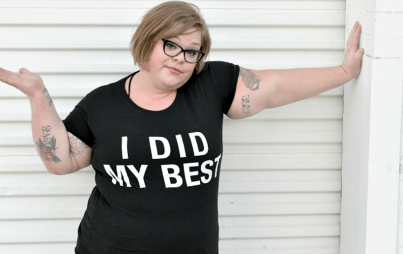
"Moreno's case still deserves our attention... because it really brings to light the fact that fat-shaming hurts people of all sizes." Image: today.com
Alexa Moreno recently found herself the subject of a whole lot of fat-shaming on social media. Normally, that would be no surprise since, sadly, there’s tons of fat-shaming on social media every day (ask any fat activist), but this was a bit different, in that Alexa weighs 99 pounds — and is a gymnast who had just finished competing in the freaking Olympics.
Happily, people took to social media to put the fat-shamers in their place, which is exactly as it should be.
Unfortunately, some suggested that the reason she shouldn’t be fat-shamed is because she’s not fat, or because she’s an Olympic athlete.
This is a problem, because when we suggest that someone shouldn’t be fat-shamed because they’re “not fat,” or “not that fat,” or don’t meet someone’s stereotypes about fat people, we suggest that there is some circumstance in which it would be ok to fat-shame. That's a bad road to go down, because that’s just not the case.
She shouldn’t be fat-shamed because nobody should be fat-shamed. A person shouldn't have to be an Olympian to avoid cruel treatment and bullying. So even if we don’t think she’s fat, it might be better to reply with something like, “Nobody should be fat-shamed, including a 99-pound Olympic gymnast.”
Moreno's case still deserves our attention, though, because it really brings to light the fact that fat-shaming hurts people of all sizes. Now, this is a complicated discussion, but hear me out. I’m going to use the “P word,” but stay calm and stick with me, and we’ll get through this together.
Thin privilege is a fact, it’s real, and that’s not up for debate. The world is built for thinner people: thin people can expect that they will be able to find clothes in their size at a mall, that they will be able to fit into bathroom stalls, that they will have a seat that accommodates them wherever they go (and that they won’t be asked to pay double for the same service).
And that’s before we start looking at differences in treatment in work and medical settings.
Remember that thin privilege doesn’t mean that bad things don’t happen to thin people, and I’m not asking thin people to feel guilty — they typically didn’t ask for it, and can’t give it away. (They can choose to use it to make the world better for people of all sizes, but that’s a whole other article.)
Suffice it to say that thin privilege is real, and it’s also relative: As a 300-pound fat person I have more privilege than a 400-pound person, who has more privilege than a 500-pound person, because the larger you are, the less our society is built to accommodate you, and the more negative experiences you are likely to have because of people’s prejudices about people your size.
Fat-shamers claim that they are doing it “for our health” (despite the complete lack of evidence that cyberbullying increases health) and that if we would just start exercising they would leave us alone — but apparently you have to do more exercise than an Olympic gymnast, and I don’t know anyone who has that kind of time?
But, while thin privilege is real, it doesn’t insulate thin people from a society rife with fatphobia, as Ms. Moreno can unfortunately attest. Shawn Johnson also recently talked about how she was judged for her looks and not her gymnastics, including being told that she should be taller (WTF?). And you may remember that, last time around, in 2012, Australian swimmer Leisel Jones had to deal with a poll in a major newspaper in her home country asking readers if they thought she was “fit” enough to compete in the Olympics, despite the fact that she had qualified for the fucking Olympics in the sport of swimming and not the sport of “being as thin as you think I should be.”
Thin privilege also doesn’t insulate people from becoming nearly incapacitated by the fear of becoming fat — not because being fat is, in and of itself, bad, but because people fear being treated the way that fat people are treated (even, perhaps, the way that they treat fat people).
Fat-shaming and the fear of being treated like fat people are treated prevent people from being able to achieve their dreams and live the lives they want, whether that's trying out for America's Got Talent, taking a Zumba class at their gym, or having sex with the lights on without wondering if reverse cowgirl is a “flattering” position.
Also, while there are certainly women who fat-shame, often this kind of fat-shaming is deeply rooted in misogyny. It’s about men trying to show women that, no matter what, if they are within sight of men they are “putting themselves out there” to be judged, and they should never forget that what men think of how they look is important, and they owe men “pretty” by each man’s personal definition — or else they deserve to be ridiculed by anonymous cowards online.
The poor treatment of Alexa Moreno also shows how boots-deep you have to be to accept the fat-shamer’s BS “justifications” for their abhorrent behavior. We are told that they fat-shame to help encourage weight loss, and that if fat people just lose weight they will leave us alone, but apparently you have to be less than 99 pounds for that clause to kick in.
They claim that they are doing it “for our health” (despite the complete lack of evidence that cyberbullying increases health) and that if we would just start exercising they would leave us alone — but apparently you have to do more exercise than an Olympic gymnast, and I don’t know anyone who has that kind of time?
The truth is that these people like to be cruel to fat people and they’re happy to feed us any justification that we are willing to believe so that they can keep doing it without being called out.
Fat is not, as is too often suggested, the “last acceptable prejudice.” Racism, transphobia, homophobia, ableism, ageism, classism, and more are still alive and well and far too accepted. But fat-shaming is an acceptable prejudice, and it’s time that we shut that down.
We have to be clear that it’s not acceptable, no matter what size the victim is, or what the excuse or “justification.” We have to be clear that fat people (like people of all sizes) have the right to live in fat bodies without shame, stigma, bullying, harassment, or oppression — and it doesn’t matter why we’re fat, what the “consequences” of being fat might be, or if we could, or want to, become less fat or not fat.
Fat-shaming should not be an Olympic sport. It shouldn’t even be a pick-up game at your local rec center. It should be retired permanently — and until it is, we should keep calling it out whenever we see it.







